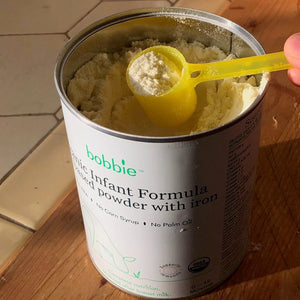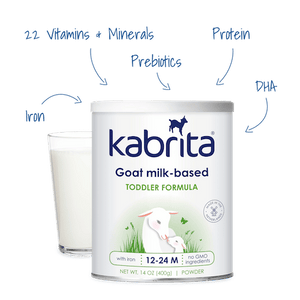Below is an email I recently sent to a private client of mine. Since the number one question I receive is “What is the safest infant formula?,” I thought some of you might be interested in my analysis of the two safest brands of baby formula, HiPP vs. Holle (both from Europe). Note that whichever formula you choose, you should always use a water filter to remove chlorine (carcinogenic) and fluoride (linked with lowered IQ). (Here’s more on why you should get a filter and which ones I like.)
Dear E.:
So the bottom line is I would recommend Holle formula as the best option, but it’s not without some problems, unfortunately (yet again it becomes clear that nothing can compare with breastmilk). HiPP is superior in a few ways, but I’ll explain why ultimately I would go with Holle below.


Here’s what I considered when researching HiPP vs. Holle:
- Palm oil. Palm oil is an ingredient that a lot of people worry about (suspected to affect bone density), and both HiPP and Holle contain it. However, because they each contain a blend of other oils (like coconut and sunflower), I don’t think the amount is as concerning. They do both also contain rapeseed oil, otherwise known as canola oil, which is also somewhat controversial. It’s worth noting that Baby’s Only doesn’t contain palm oil–but it does contain soybean oil, which I don’t like, so not really a huge win.
- Aluminum issue. The HiPP ready-made formula is preferable to the HiPP powder because the latter has strangely high aluminum levels, although even the ready-man has borderline levels. (I can’t figure out why–possibly because it comes in aluminum pouches (within a cardboard box)). However, in general I actually DON’T like ready-made formulas because they contain soy lecithin (sometimes extracted with hexane…and soy is problematic anyway because of its estrogenic properties). On the other hand, the amount of lecithin is relatively small, and probably worth the trade-off. Note that the HiPP Growing Up milk in powder form actually has much lower levels of aluminum (but you can’t use that until after 12 months, and it does contain soy lecithin. Sigh). Bottom line here is go for ready-made or Growing Up milk if you do get HiPP, but with Holle you don’t have to worry about this.
- LCP oils. The addition of omega 3 and 6 oils in U.S. formulas is controversial because of the extraction methods (super complicated issue so I’ll spare you all the details). HiPP has these added oils, but I suspect the extraction methods are probably required to be cleaner in Europe. Unfortunately, I’ve been unable to get to the bottom of this, so it’s a question mark and potentially another negative for HiPP. And studies show that the addition of the oils doesn’t improve the nutrition for babies anyway, so their absence isn’t really a negative for Holle.
- Organic practices. Both of these companies have been around for more than 50 years, and the dairy products from both come from grass-fed, organic cattle, certainly of a higher quality that anything you get here. Holle farms are certified organic and biodynamic–which I’ll simplify by saying is like organic-plus, with very strict standards from the processing all the way to the packaging. Another point in the Holle column.
- Sugars. All formula has a lot of sugar (breastmilk is naturally quite sweet), and HiPP wins in this category, as it uses lactose as a sweetener, which is the best option (and also the most expensive). Holle uses maltodextrin (a plant-based sweetener), although it seems to use less of it than most American formula brands. And here’s an update from July 2015: Lebenswert is a newish formula under the Holle umbrella. The Stage 1 Lebenswert formula contains lactose instead of maltodextrin, and Lebenswert is now available at here!
- Prebiotics. This is another win for HiPP. Holle doesn’t contain these, and it’s one of the big things found in breastmilk but missing from formula.
Bottom line: Both HiPP and Holle are superior to American formulas, in my opinion. They lack many of the concerning ingredients found in most formula you get here, don’t have white sugar or corn syrup in them, and also skip some preservatives and the carrageenan found even in other organic formulas. If it were my baby, I would probably choose Holle because of the aluminum issues with HiPP–which to me is more concerning than the maltodextrin (the only major downside to Holle). The lecithin, biodynamic farming, and LCP oil issues further put Holle in the lead. And if you choose Stage 1 Lebenswert, you skip the maltodextrin as well.
Stay sane,






200 comments
Cornel
I got a question for anyone that has been going thru at least 2 of these formulas:
I have the ability to get Aptamil, Holle and HiPP.
What would you recommend more than the other? I been researching for weeks now to see whats better. They are pretty close, price wise, but a bit different in the ingredients.
Thanks…
Ami
Hi Maia,
Ahh ok. Lol re:enfamil :). In that case, since we have the option of Holle and Lebenswert which uses lactose, it seems to me to go with Lebenswert. Is there any reason/benefit you found in any of your research that Holle has over Lebenswert? Or are they identical except for the sugar ingredient.. Thanks so much for all your research.Ami
Ahh ok. Lol re:enfamil :). In that case, since we have the option of Holle and Lebenswert which uses lactose, it seems to me to go with Lebenswert. Is there any reason/benefit you found in any of your research that Holle has over Lebenswert? Or are they identical except for the sugar ingredient.. Thanks so much for all your research.
Evelyn Velez
I agree, I discovered LWO from this page as well and began ordering thru them for a few months until I discovered that I was being charged almost $10 more for each box than other legitimate websites and her order form always seemed to be taken down after just an hour, so the majority of the time I would stress that I wouldn’t wake up in time to place my order. After being fed up I began buying thru my cousins friend’s site www.naturalbabyorganics.com because she offered free pick-up from her house if you live in the San Francisco Bay Area and her prices were lower.
Organicbaby15
That’s why there’s organicbaby15, no membership required, no tax, no shipping fee. The more you buy, the cheaper it gets.
Laura
Please respond to Merediths post, made February 10th, concerning LittleWorldOrganics taking advantage of the consumer. I think she is exactly right, and I think your readers deserve to know why you endorse such a money hungry company. Thank you!
Maia James
Thanks so much for sharing, Merry!
Merry
After I read this article I was a little concerned about the aluminium content of Hipp formula, as I actually would prefer Hipp for my baby boy. So I decided to email the company direct, and here’s their reply to me.
“Dear Merry Alfred, Thank you for your email and interest in the products of HiPP. There has been an official statement from HiPP in August 2014 on Aluminium in Milk formulas. The British journal BMC Pediatrics published an article by Chuhu et al. on excess levels of aluminium in infant milk formulas. The article is an update of a study written in 2010 which was conducted by the same group of researchers. HiPP Organic milks are carefully formulated for use from birth, and, of course, meet all legal requirements, as well as satisfying the most stringent quality controls. The levels of aluminium in the products are well within the defined levels set by the European Food Safey Authority (EFSA). Aluminium is the most abundant metal in the Earth’s crust and can be found in almost all foods. Consequently, minimal amounts are naturally contained in the raw dairy products which are used to make infant formulas. The European Food Safety Authority (EFSA) has defined a tolerable intake level for aluminium. The value for our infant formula, which was criticised in the English study, is well below this tolerance level. The analysis results published in the study do however indicate that some HiPP products are in the lower range of all tested reference formulas. Compared with the levels in the 2010 study, we have been able to lower the aluminium levels, We assure you that we are working hard on reducing contamination from aluminium in our products. The recent study confirms that our efforts to reduce aluminium levels are already showing the first signs of success. Naturally, we are working on lowering the levels further. We would like to assure you that HiPP Organic milks are carefully formulated to provide balanced nutrition for your baby: you can rely on our extremely high safety and quality controls. I hope this information has been useful to you. Kind Regards, Petra HiPP Klantenservice" …And I would like to add that I have been using Hipp formula for my baby and it’s great!Meredith
I personally wouldn’t recommend Little World Organics for the simple fact they’re taking advantage of parents. Requiring membership fees that can exceed $150/month just to have access to products that you then have to pay high prices for anyways. It’s immoral, in my opinion, to profit off parents trying to do the right thing for their children by feeding them higher quality formula. In addition it creates an elitist culture. Perhaps that parent only has the money for X amount of formula for the month. Now they are forced into feeding their child inferior USA made formula due to these absurd fees. Wow!
Maia James
Hi there-
I can only advise you to speak to a pediatrician you trust to get advice on the right amount of iron for your baby.